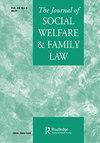流离失所的生活:被“起诉”后遭受家庭暴力的妇女幸存者的经历
IF 0.9
Q2 LAW
引用次数: 2
摘要
摘要本文报道了对10名经历过1980年《国际儿童拐骗民事方面公约》(《海牙公约》或《公约》)法律程序的妇女的采访。我们把这种经历称为“被诅咒”。所有这些妇女在逃离前伴侣实施的家庭暴力和家庭暴力后,都受到了海牙遣返令的约束,因为她们带着孩子跨越国际边界逃离。随后,所有妇女都被命令将她们的孩子送回虐待她们的前伴侣居住的国家。十分之九的妇女也带着孩子回来了。返回后,妇女遭受了进一步的伤害:她们很容易受到前伴侣的进一步恐吓和控制;他们无家可归;通过减少接触和监护安排,他们感到受到了遣返国法院的惩罚。文章最后建议,如果《公约》、国内实施法以及最终评估遣返申请的法院更加重视和理解家庭暴力和家庭暴力,那么接受采访的妇女可能不会被命令遣返她们的孩子,她们也不会在海牙事件后受到进一步的伤害。本文章由计算机程序翻译,如有差异,请以英文原文为准。
Dislocated lives: the experience of women survivors of family and domestic violence after being ‘Hagued’
ABSTRACT This article reports on interviews with ten women who had experienced the legal process of the 1980 Convention on the Civil Aspects of International Child Abduction (the ‘Hague Convention’ or the ‘Convention’). We refer to that experience as being ‘Hagued’. All the women were subjected to a Hague return order after fleeing family and domestic violence perpetrated by their previous partner, because they fled with their children across international borders. Subsequently, all women were ordered to return their children to the country where their abusive previous partner lived. Nine out of the ten women also returned with their children. On return the women experienced further harms: they were vulnerable to, further intimidation and controlling behaviour from previous partners; they became homeless; and they felt punished in ordered from returning country’s courts through reduced contact and custody arrangements. The article concludes by suggesting if the Convention, the domestic implementation laws and ultimately the courts assessing return applications, placed greater emphasis and understanding on family and domestic violence, then the women interviewed probably would not have been ordered to return their children and they would not have experienced further post-Hague harm.
求助全文
通过发布文献求助,成功后即可免费获取论文全文。
去求助
来源期刊
CiteScore
2.00
自引率
13.30%
发文量
52
期刊介绍:
The Journal of Social Welfare & Family Law is concerned with social and family law and policy in a UK, European and international context. The policy of the Editors and of the Editorial Board is to provide an interdisciplinary forum to which academics and professionals working in the social welfare and related fields may turn for guidance, comment and informed debate. Features: •Articles •Cases •European Section •Current Development •Ombudsman"s Section •Book Reviews

 求助内容:
求助内容: 应助结果提醒方式:
应助结果提醒方式:


